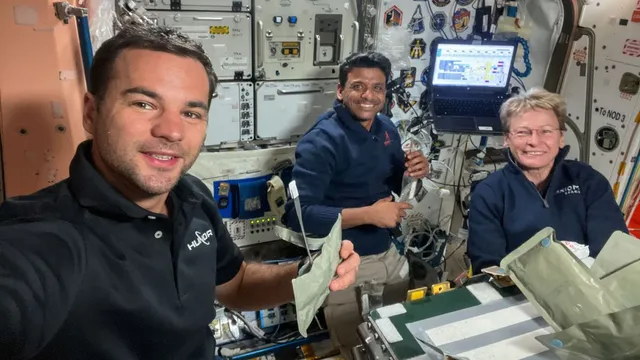- By Nidhi Giri
- Wed, 09 Jul 2025 05:23 PM (IST)
- Source:JND
Indian Space Research Organisation (ISRO) astronaut and Group Captain Shubhanshu Shukla (Shux) is close to finishing his 14-day mission aboard the International Space Station. The Axiom-4 crew has entered its final leg with the return to Earth anticipated any day after July 10, unless extended.
NASA is yet to announce a return date. The return would depend on factors such as weather conditions off the coast of Florida, where the capsule is expected to splash down, spacecraft readiness, orbital schedules among others.
Shux and others from the Axiom-4 mission on Saturday studied how bones react to microgravity conditions, an experiment that could lead to better treatment of osteoporosis on Earth.
On the 10th flight day, Shukla also participated in an experiment to monitor radiation exposure on the International Space Station (ISS), which could help better protect astronauts on longer-duration space missions away from Earth. During his space stay, the team is scheduled to conduct at least 60 experiments.
Lucknow-born Shukla is part of a 14-day mission to the ISS conducted by Axiom Space. Veteran US astronaut Peggy Whitson is the commander of the mission. Hungarian Tibor Kapu and Polish astronaut Slawosz Uznanski-Wisniewski are mission specialists.
"Shux deployed samples for the Space Micro Algae investigation. These tiny organisms might one day help sustain life in space, providing food, fuel, and even breathable air. But first, we need to understand how they grow and adapt in microgravity," Axiom Space said in a statement.
Shukla's Crucial Experiments In Space
The crew participated in the Bone on ISS experiment, providing insight into how bones deteriorate in space and how they recover once back on Earth. By analysing biological markers related to bone formation, inflammation and growth, researchers are building a digital twin -- a virtual model that can simulate how an astronaut's bones respond to spaceflight and recovery,
Axiom Space said. "This personalised approach could revolutionise astronaut health screening, allowing mission planners to predict skeletal risks and tailor countermeasures for each individual. Beyond space, the findings may also lead to better treatments for osteoporosis and other bone-related conditions here on Earth," it said.

